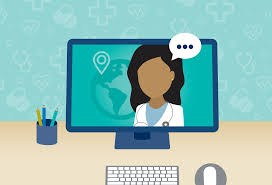It’s safe to say startups will always thrive on innovation. One leading disruptor right now is telehealth. Crucially, in a climate where healthcare is needed more so than ever before, many small businesses are focusing on smart ways to share it around. But what does this actually involve?

What is Telehealth?
Telehealth is a term that relates to healthcare delivered through a range of technology. The term telecare is also used to help establish when advancing tech is supporting the healthcare needs of the global population. During COVID-19, there has been growing interest in telemedicine. That is particularly the case thanks to a dependency on social distancing measures.
One key example of telemedicine may be that of a simple monitoring system. This could take readings from a patient, such as heart rate and blood pressure, and deliver them to medical professionals. Similarly, telehealth can also cover elements such as remote coaching and therapy.
During the COVID-19 pandemic, remote consultations and therapies have become the new normal. Therefore, it is unsurprising that startups are continuing, more so than ever, to look at the future of telecare beyond the pandemic.
Why is Telehealth So Big for Startups Right Now?
Telehealth is signaling to many as more than just a passing, short term solution. McKinsey & Company reports suggest that the industry for telehealth and telecare beyond COVID-19 could grow to as much as $250bn worldwide. It’s also thought that interest in telemedicine amongst medical professionals has risen by up to 57%. That, of course, is a knock-on effect of the pandemic.
McKinsey believes that up to 20% of future healthcare could go digital. As mentioned, this could mean that patients can test at home and submit data through apps. Naturally, it is not hard to see why so many growing companies are excited.
Startup companies offering telecare are seeing increasingly significant interest from big pharma. That is a key indicator that Q3 and Q4 of 2020 could be huge growth periods for healthcare innovators. The world is starting to notice that healthcare needs to become more efficient and more convenient.
There is also a clear benefit for healthcare services, too. Remote consultations and data capture will relieve the need for appointment booking and doctor availability. There will also likely be greater emphasis placed on self-assessment and care, too.
What Does the Future Hold?
Smaller innovators are likely to take hold of the technological side of this phenomenon with gusto. The interest is already tangible, and with concerns rising that second and third waves of the coronavirus may not be too far away, demand for telehealth could hit even higher peaks towards Q4.
Healthcare investors and telecare startup companies may be able to find each other through databases such as Fundz. In the meantime, it is clear that there will be a future for digital diagnosis and treatment beyond the pandemic. Social distancing is opening the world’s eyes to a more effective, more efficient future.